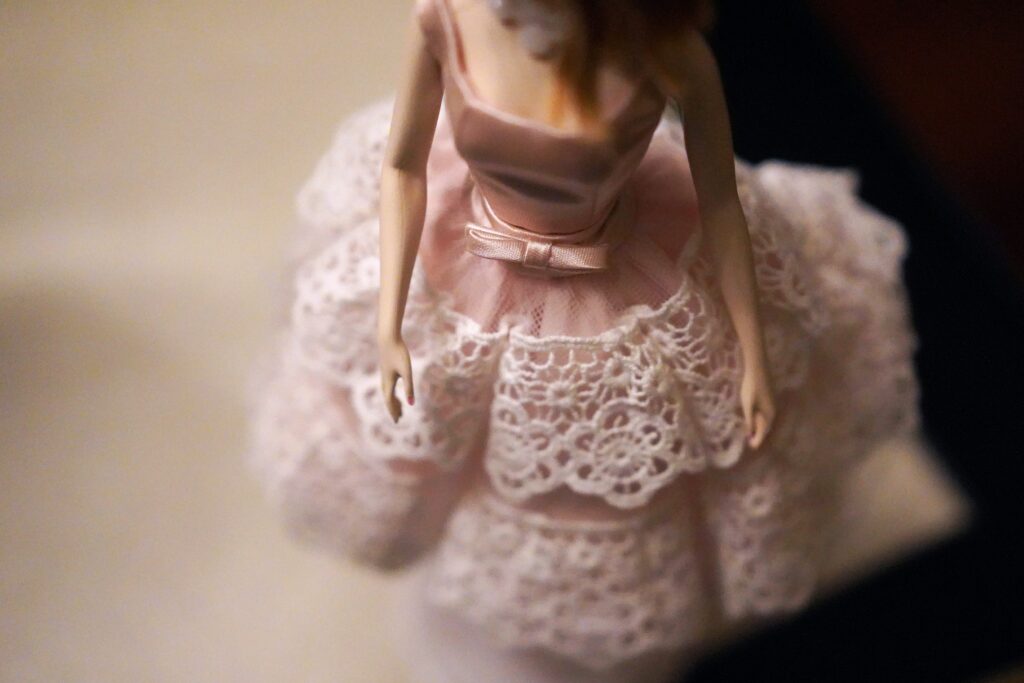Stonecoast Review
The Literary Journal of the Stonecoast MFA
A Doll’s Fingerprints

By Elizabeth Kirschner
At first, my husband Lou was akin to a saint carried in a procession. Back then, I didn’t know how to occupy the dark, especially when it was stretched out.
Left to rot, our marriage became that sound Lou loved so much, smaller than a cricket’s—my cries, an arsenal in his mouth.
Because we failed to quiet the animals inside us, we grew vicious—two swans locked in the bed, stinking, a wing of sweat opening, like an oven.
Now if I close my eyes, his smell—parasitic ash, swamp woods—runts me, until even the hollow my body makes is gone.
When Lou’s hand unfolds to strike me, it means everything can be forgiven, but never will be.
“Stop,” is what I tell Lou, but the afternoon is a suffocation.
“But,” he says, “death is the most beautiful posture.”
I agree. “Isn’t it because it looks like woe?”
“It’s supposed to hurt,” is how he replies. “Remember how those drunk girls sang?”
When his voice rumbles, I mimic it, like a song on the radio, or an animal torn apart.
When I look at Lou, I can’t help but think about what happened. It wasn’t a simile, it was a scene, an event, the way nothing falls into heaps of nothing, like a junkyard.
He stands in it. The house stands in it, night falls into nothing and the quietude, the first alone.
Wanting is terrible. I know this as I stand at the kitchen sink. In me is a snail-sized fetus. It clings to my womb, a tiny clairvoyant.
When his hands unfold to strike me yet again, I yell, “You’re such a savagery,” but he hits me anyway.
Leaving the house, his face looks pockmarked as he replies, “Absence is a riddle. It both vanishes, stays.”
Once he’s gone, I think about what he’s done to me, which is why I haven’t told him about the baby.
In my body is the fetus, its utter immediacy. The person I wasn’t, I’m becoming, but I fear Lou’s mind, its bony inklings which ratchet, like weapons, or tools.
Don’t I also fear the signature of scourge, as he says, “Press your fingers into the wound, believe?”
Isn’t expectation always violent, as is the sun, as is Lou, who’s a cutthroat? Isn’t this why we’ve never talked about the night we went out for a drive?
There was just the road, wide enough for the truck, the truck wide enough for the two of us to sit beside one another without touching.
There were no fences to speak of, just variable dusks. I loved the dust that kicked up, loved what a dirt road does to a truck.
There was no edge to the woods, just a blond path stretching out of the dark green, like a leg bone, the radio catching a hit station before moving onto static.
That night, in another truck, two girls rode ruthlessly beside each other—one filthy as a story, the other filthier as a storyteller.
The truck smelled like a line of poured out gasoline, old evening air, warm beer. We had plenty of time. We were in the middle of nowhere. When the music stopped, there was an embarrassment of sunset. Why even talk about the stars?
The girls wore each other out is what I mean. Passed out in each other’s arms, like the end of a sentence while taking belts of whiskey out of a bottle.
The empty fifth one girl held in her hands is where the story turns dark, is where I stick myself against it, flush as a poster.
Both girls were breathless. It was ruthless knowing what was about to happen to someone who didn’t know what was about to happen.
As I said, this is where the story turns dark: the smell of fresh pine, the small task of rain on the windshield, the sound of Lou’s knife teasing itself across one girl’s collarbone, then the other’s.
It was the teasing he loved, the sound of it like rust, or a stinger. And their fear, which was heavy as oil, but somehow fragrant, like a doll’s fingerprints.
He then booted them out of the truck. It was like shaking dust off of a slipper. They looked ghastly. Each of their wiener-thin necks were ringed, like a cat’s tail.
My heart sank, as I put the knife back in the glovebox. Oh how my hands shook. I was staring at those girls, as they stumbled, their high heels grinding the dirt, like thumbs pressed into one’s eyelids.
As we started driving back down the road, the baby kicked. Swiftly, deftly. I wanted to bag it in the theater of my womb, keep it from being mottled, or torn.
The dust nearly paved over what had just happened. But those girls, they even waved, their hands, junky as fans, or a quaint piece of quiet.
God may have missed it all, but I didn’t. I saw how Lou held each one, licking her, like the skin off hot milk. There was a sacredness, a blankness, then everything became a fall, an exodus. I loved this, loved Lou, even those girls.
After the ignition’s click, only the scalene air, which tasted like immeasurable desire, but old, yellow, a fine, sifted dust, yet crisp, as in linen, or death.
ELIZABETH KIRSCHNER is a writer and gardener from Boston, Massachusetts. Visit her on the web at elizabethkirschner.com.
This story won the adult category in the 2024 Blue Hill Literary Arts Festival and originally appeared in Stonecoast Review Issue 22.
Photo by XINYI SONG
